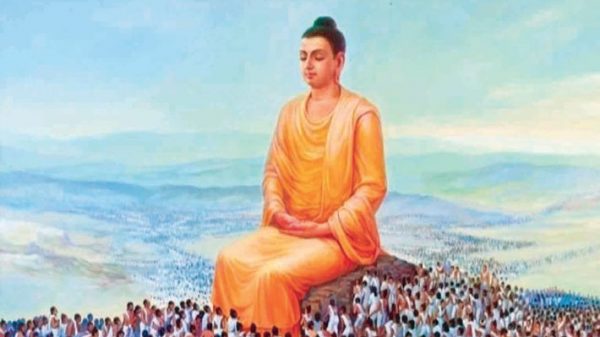Buddha Purnima: Birth anniversary of Gautam Buddha

- Update Time : Saturday, March 19, 2022
- 142 Time View

Buddha Purnima or Buddha Jayanti is a major festival celebrated with great pomp and fervour in countries like Bangladesh, Sri Lanka (where it is called Vesak), India, Nepal, Bhutan, Burma and numerous other South East Asian countries, including Thailand, Tibet, China, Korea, Laos, Vietnam, Mongolia, Cambodia, Singapore and Indonesia, though celebrations vary from country to country.
It falls on a full moon day in the month of Vaisakh (April/May) according to the calendar. In Theravada Buddhism, it is also observed as the day when Buddha, born as Prince Siddhartha Gautama (c. 563-483 BCE) attained Nirvana (salvation) under the Mahabodhi tree at Bodh Gaya, Bihar, as well as his death anniversary. The Vesak full moon day is the most important day in the Buddhist calendar. Several Buddhists go to the pagodas to pour water at the foot of the sacred tree in remembrance of the Buddha’s Enlightenment.
Devotees of Buddha visit temples, light candles and incense sticks, pray and offer sweets and fruits before the statue of Lord Buddha. Sermons on the life and teachings of Buddha are held and attended by followers all over. People usually dress in white, do not consume non-vegetarian food and distribute kheer, as according to Buddhist lore, on this day a woman named Sujata had offered Buddha a bowl of milk porridge.
Many followers also free caged birds on this day as a symbol of empathy and compassion for all living beings, one of the most important teachings of Lord Buddha.
In Bangladesh, Buddha Purnima heralds a time for renewed spiritual activity in some sacred Buddhist locales. The day is celebrated by holding fairs at different villages of Chittagong district. Offering alms to the monks are considered meritorious. Uposatha rules are recited (these are Buddhist observances dating back to the time of the Buddha, during which members of the sangha evaluate their discipline as laid down in the Patimokka, the code of law governing conduct within the sangha). Traditionally, a minimum of four monastics is required to recite the Patimokkha but when fewer monastics are present, the Vinaya prescribes alternative activities. The most senior monk of the group leads the ceremony, following a ritual for mental purification. Fairs are also held in Bangladesh, mainly in Chattogram. Some of the most famous fairs are called: Shakyamuni Mela, Achariyar Mela, Dhatu Mela, Bodhi Mela, and Dhatumela Falguni Astami
In India, a large fair takes place in Sarnath, Uttar Pradesh, a major Buddhist pilgrimage site where Buddha is said to have delivered his first sermon after attaining enlightenment. The relics of Buddha are taken out for public display in a procession. Many Hindus also believe Buddha to be the ninth incarnation of Lord Vishnu.
According to the British Library blog, “Every full moon day is an auspicious day for Buddhists, but the most important of all is the day of the full moon in May, because three major events in the life of the Gotama Buddha took place on this day. Firstly, the Buddha-to-be, Prince Siddhattha was born at Lumbini Grove on the full moon day in May. Secondly, after six years of hardship, he attained enlightenment under the shade of the Bodhi tree and became Gotama Buddha at Bodh Gaya also on the full moon day of May. Thirdly, after 45 years of teaching the Truth, when he was eighty, at Kusinara, he passed away to nibbana, the cessation of all desire, on the full moon day of May.”
Buddha’s teachings to use in daily life:
Soon after Buddha achieved enlightenment, he gave his first discourse called Dhammacakkappavattana Sutta or Turning the Wheel of Dhamma, to five ascetics in the deer park at Isipatana in Benares (present-day Varanasi). These five ascetics became his first disciples and his teachings attracted many followers, who then joined the Sangha, the community of monks. Lord Buddha thereafter visited his ailing father to preach the Dhamma. After hearing his teachings, the king attained arahatta (perfect sanctity) before he passed away. This was followed by The Buddha preaching the Abhidhamma or the Higher Doctrine to his former mother, who was reborn as a deva with other deities in the Tavatimsa heaven. He then founded the order of Buddhist nuns. During his long ministry that lasted forty-five years, Lord Buddha walked throughout North India, and taught about the suffering of life, how to end it, how to attain peace and nibbana, to all those who listened.
Here are some of Gautam Buddha’s teachings that anyone can use in his/her daily life:
“It is better to conquer yourself than to win a thousand battles. Then the victory is yours. It cannot be taken from you.”
“If you knew what I know about the power of giving you would not let a single meal pass without sharing it in some way.”
“Learn this from water: loud splashes the brook, but the oceans depth are calm.”
“You only lose what you cling to.”
“The past is already gone, the future is not yet here. There’s only one moment for you to live.”
“The trouble is, you think you have time.”
“Your work is to discover your work and then with all your heart to give yourself to it.”
“Believe nothing, no matter where you read it, or who said it, no matter if I have said it, unless it agrees with your own reason and your own common sense.”
“The tongue like a sharp knife… Kills without drawing blood.”
“Teach this triple truth to all: A generous heart, kind speech, and a life of service and compassion are the things which renew humanity.”
“We are shaped by our thoughts; we become what we think. When the mind is pure, joy follows like a shadow that never leaves.”
Courtesy: The Hindustan Times















